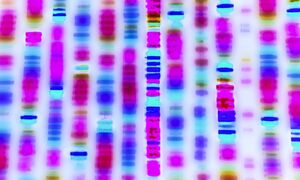Genomic Medicine
We're working in partnership with NHS England and the NHS Genomic Medicine Service to develop a personalised and predictive healthcare solution through the use of genomics.

What is genomic medicine?
Genomic medicine uses insights from a human's complete set of DNA (called a genome) to inform their healthcare.
But because people are very different, studying a genome by itself can't tell you very much. To make sense of it, it's essential to know much more about the person and their health, as well as their DNA.
Genomic medicine combines these two elements, using the science of genomics alongside information about a person's health to improve diagnosis and treatment.
At Genomics England, we partner with the NHS to provide platforms that enable genomics to be used to diagnose more accurately, treat more effectively, or even spot conditions before symptoms appear.
How is genomic data gathered?
Anyone who is offered whole genome sequencing as part of their care in the NHS Genomic Medicine Service (GMS) is asked to consent to having their genome sequence and health data and/or their sample (blood/saliva/tissue, etc.), accessible for research. It's your choice.
If you agree, your samples will be stored securely and your data will be added to the National Genomic Research Library, a secure national database of de-identified genomic and health data managed by us.
80%
120K+
90%
History of genomics
The UK has a strong history in genomics from Watson and Crick’s discovery of DNA to the invention of DNA sequencing. The NHS has been undertaking genomic testing for decades and there has been significant government and NHS investments to support continued progress.
In 1990, an international consortium of researchers launched the Human Genome Project with the goal of sequencing the first whole human genome. The programme was completed in 2003 and yielded the discovery that there are approximately 20,500 human genes, of which 95% were a mystery.
On the back of that discovery, along with advances in technology, researchers set out to sequence and study more genomes in order to understand the role genes play in health and disease. In the UK, in 2012, this programme was called the 100,000 Genomes Project, which marked the birth of Genomics England to lead and coordinate the research.
Making an impact
See the areas where genomic data is being used to improve patients' lives
Cancer 2.0
Our initiative to integrate long-read sequencing technology and multimodal…
Diverse Data
Working in collaboration with researchers and the NHS, our Diverse Data…
100,000 Genomes Project
Information on the 100,000 Genomes Project, including an overview of the…
COVID-19 Study
Read about our partnership with the GenOMICC consortium, led by the…


